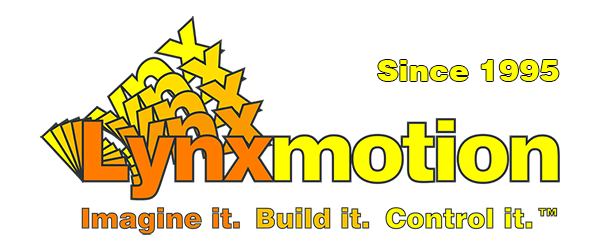Changes for page LSS FlowArm - Setup
Last modified by Eric Nantel on 2023/02/21 10:31
Change comment: There is no comment for this version
Summary
-
Page properties (1 modified, 0 added, 0 removed)
-
Attachments (0 modified, 2 added, 0 removed)
Details
- Page properties
-
- Content
-
... ... @@ -11,31 +11,15 @@ 11 11 It will automatically try to find the connected Arm but, if not, you can manually choose the appropriate COM port from the drop-down list & the baud rate (default is 115200) 12 12 ))) 13 13 | |(% colspan="4" %){{lightbox image="LSS-FlowArm-Arm-Selection.png"/}} 14 -| |(% colspan="2" %) | | 15 -| |(% colspan="4" %)The software sends a query to servo ID1 and once a reply is received, it determines connection has been established and a green light will be displayed aside the COM port. 16 -| |(% colspan="4" %) 14 +| |(% colspan="4" %)5. The software sends a query to servo ID1 and once a reply is received, it determines connection has been established and a green light will be displayed aside the COM port. 15 +| |(% colspan="2" %){{lightbox image="LSS-FlowArm-COM-Searching.png"/}}|(% colspan="2" %){{lightbox image="LSS-FlowArm-COM-Found.png"/}} 17 17 18 -= Connecting via USB = 19 - 20 -1. Connect the USB cable to the LSS Adapter board on your robot 21 -1. Plug the USB connector into the PC 22 -1. Connect your LSS to the LSS-Adapter with the Lynxmotion cable 23 -1. Connect the power to the LSS Adapter via the yellow XT60 plug 24 -1. Power on the robot (On/Off switch) 25 -1. Start the LSS FlowArm software 26 -1. Select the type of LSS Arm you are using (3 DoF / 4 DoF / 5 DoF) 27 -1. It will automatically try to find the connected Arm but, if not, you can manually choose the appropriate COM port from the drop-down list & the baud rate (default is 115200) 28 -1. The software sends a query to servo ID1 and once a reply is received, it determines connection has been established and a green light will be displayed aside the COM port. 29 - 30 -= Calibration = 31 - 32 -1. Go in "TEACH" mode with the button on the top bar. 33 -1. Manually place the arm in the correct position for your model and with the gripper closed. (see images bellow) 34 -1. Store the values or Offsets by clicking "STORE OFFSETS" 35 -1. At that point the arm should "stay" in that position once released 36 -1. Exit the "TEACH" mode by clicking it again 37 - 38 -= Calibration Positions = 39 - 40 -|(% colspan="2" rowspan="1" style="text-align:center; vertical-align:middle" %)**4 DoF**|(% colspan="2" rowspan="1" style="text-align:center; vertical-align:middle" %)**3 DoF ** 41 -|(% style="text-align:center; vertical-align:middle" %)[[image:[email protected]||width="200"]]|(% style="text-align:center; vertical-align:middle" %)[[image:[email protected]||width="200"]]|(% style="text-align:center; vertical-align:middle" %)[[image:[email protected]||width="200"]]|(% style="text-align:center; vertical-align:middle" %)[[image:[email protected]||alt="lss-flowarm-left-3dof.png" width="200"]] 17 +(% style="width:700px" %) 18 +|(% colspan="5" %)**Calibration (Store Offsets)** 19 +|(% style="width:10px" %) |(% colspan="4" %)1. Go in "TEACH" mode with the button on the top bar. 20 +|(% style="width:10px" %) |(% colspan="4" rowspan="1" %)2. Manually place the arm in the correct position for your model and with the gripper closed. (see images bellow) 21 +|(% style="width:10px" %) |(% colspan="4" %) 22 +|(% style="width:10px" %) |(% colspan="4" %)3. Store the values or Offsets by clicking "STORE OFFSETS" 23 +|(% style="width:10px" %) |(% colspan="4" %)4.At that point the arm should "stay" in that position once released 24 +|(% style="width:10px" %) |(% colspan="4" %)5. Exit the "TEACH" mode by clicking it again 25 +|(% style="width:10px" %) |(% colspan="4" %)
- LSS-FlowArm-COM-Found.png
-
- Author
-
... ... @@ -1,0 +1,1 @@ 1 +xwiki:XWiki.ENantel - Size
-
... ... @@ -1,0 +1,1 @@ 1 +27.1 KB - Content
- LSS-FlowArm-COM-Searching.png
-
- Author
-
... ... @@ -1,0 +1,1 @@ 1 +xwiki:XWiki.ENantel - Size
-
... ... @@ -1,0 +1,1 @@ 1 +27.0 KB - Content

